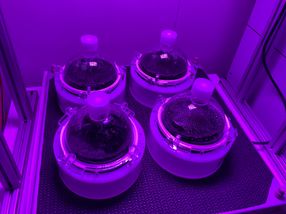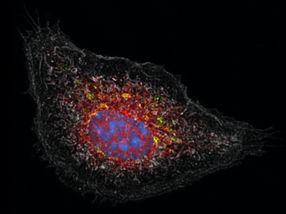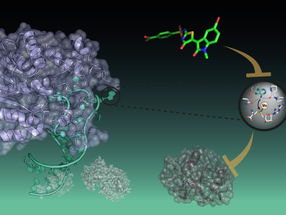"Gummy Bear" Versus Needle
New Manufacturing Process for Peptide and Protein Drugs
A team of young Heidelberg researchers has been approved for funding from the EXIST Transfer of Research programme for a new process to manufacture specific active ingredients that in future will allow oral administration instead of painful injections. The innovative process will be further developed and serve as the basis for a start-up business. The Federal Ministry for Economic Affairs and Energy (BMWi) is providing funding in the amount of approx. 940,000 euros. Dr Silvia Pantze and Dr Frieder Helm of Heidelberg University's Institute for Pharmacy and Molecular Biology (IPMB) were successful in their bid to obtain funding. They are members of the working group of Prof. Dr Gert Fricker, Director of the Department of Pharmaceutical Technology and Biopharmacy at the IPMB.

Peptide and protein agents like those used to treat diabetes, growth disturbances and cancer are absorbed by a lipid-based transport system. This system is compacted in a matrix. The active ingredients thus take on the size and consistency of a "gummy bear" and can be taken orally.
Working group Fricker
According to the researcher, peptide and protein agents typically used to treat diabetes, growth disturbances and cancer are usually administered by injection, some of which can be very painful. The young researchers in Prof. Fricker's team have now found a way to prepare the active ingredients such that they are about the size and consistency of a "gummy bear" and can be taken orally. A lipid-based transport system absorbs the ingredients, and the system is compacted in a matrix. To pursue the potential startup, the research team will be joined by another IPMB pharmacist, Robin Tremmel, and a young economist, who will be responsible for the business aspects. The work is scheduled to begin in October.
The EXIST Transfer of Research programme of the BMWi supports potential research-based start-ups pursuing outstanding albeit expensive and risky development research. There are two funding phases. In the first phase of up to eighteen months, in case of particularly extensive projects up to twenty-four months, the results of research with business potential are developed further. The objective is to convert research findings into technical products and processes, to develop a business plan based on the business idea and to plan the start-up business. Subsequently a second funding period of another eighteen months for further development work can be applied for. That phase focuses on measures to start business operations. EXIST Transfer of Research is co-financed by the European Social Fund.
Start-up Management of Heidelberg University and Heidelberg Startup Partners support the founding of research-based start-ups. The IPMB project was first selected from 54 conceptual ideas as one of 22 projects for presentation before a jury. Sixteen applications were ultimately recommended to the BMWi for funding.
Most read news
Organizations
Other news from the department science

Get the life science industry in your inbox
From now on, don't miss a thing: Our newsletter for biotechnology, pharma and life sciences brings you up to date every Tuesday and Thursday. The latest industry news, product highlights and innovations - compact and easy to understand in your inbox. Researched by us so you don't have to.
























































